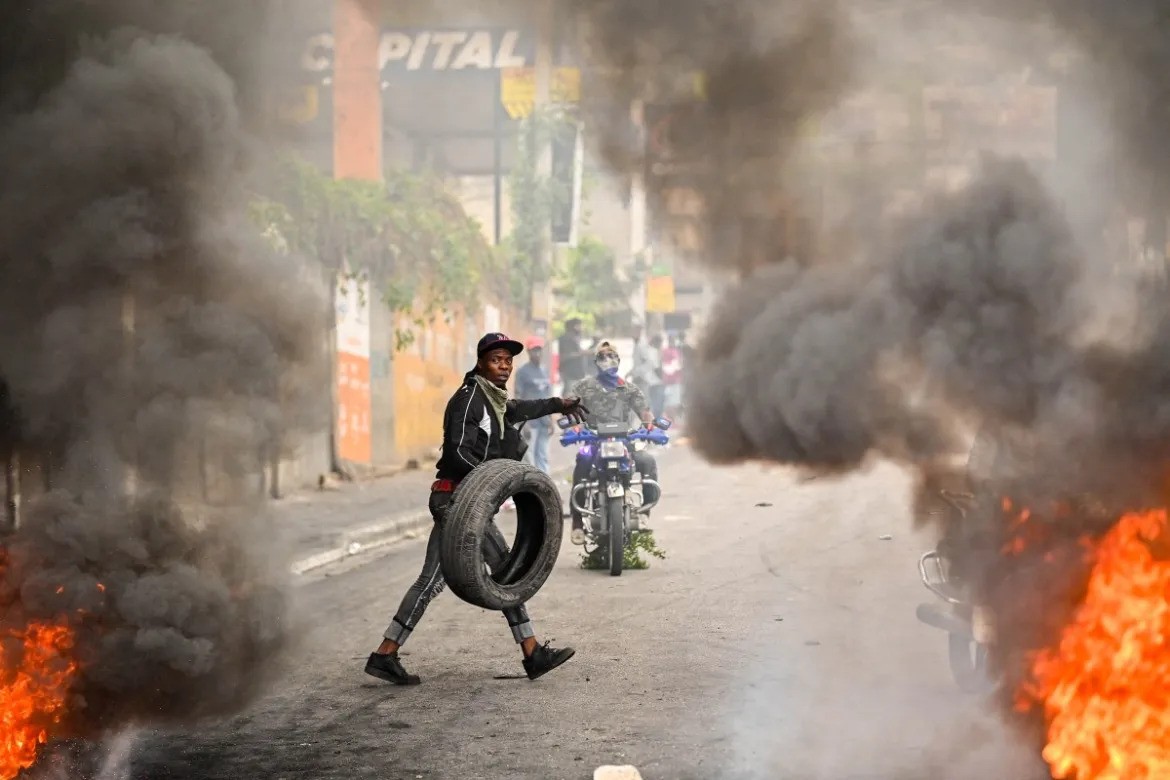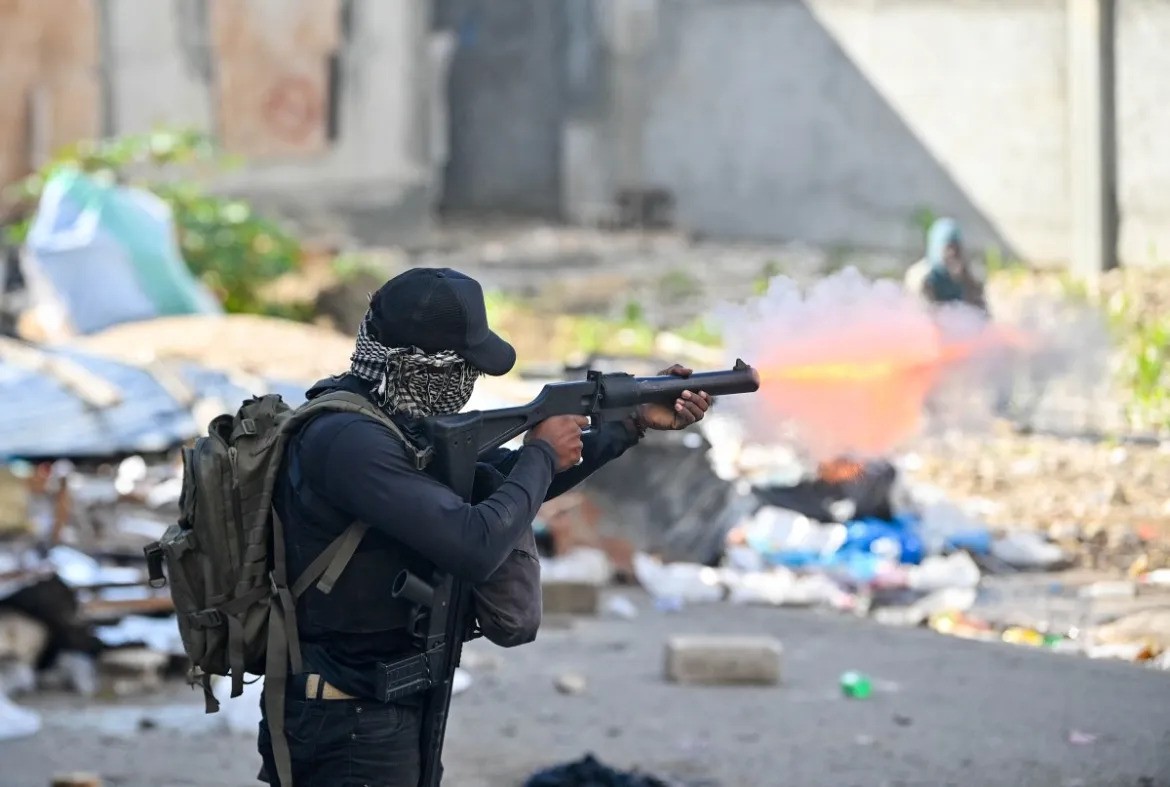Five Haiti Protesters Killed In Clash With Police As Former Rebel Leader Arrives
Five Haiti protesters killed in clash with police as former rebel leader arrives. In Haiti's capital, Port-au-Prince, five armed environmental protection agents lost their lives during confrontations with law enforcement amid intense protests aimed at ousting Prime Minister Ariel Henry, which have brought the nation to a standstill.
Author:Paula M. GrahamReviewer:Rhyley CarneyFeb 09, 20244.9K Shares120.7K Views

Five Haiti protesters killed in clash with police as former rebel leader arrives. In Haiti's capital, Port-au-Prince, five armed environmental protection agents lost their lives during confrontations with law enforcement amid intense protests aimed at ousting Prime Minister Ariel Henry, which have brought the nation to a standstill.
Since Monday, Haiti has been experiencing severe unrest, with throngs of residents from all over the city and beyond calling for Henry to resign in accordance with a 2022 political agreement.
A police insider disclosed that on Wednesday, the five members of the National Agency for Protected Areas (BSAP), a government entity armed and now in open defiance, were fatally shot after refusing to disarm and engaging in gunfire with law enforcement. Three other agency personnel were also apprehended.
As per a pact reached in December 2022 following the assassination of President Jovenel Moise a year earlier, Henry was slated to organize elections and subsequently transfer power to newly elected officials by February 7, 2024.
Nevertheless, Henry has clung to his position, with an aide indicating the prime minister's intention to establish a government of national unity. Haiti, the poorest nation in the Western Hemisphere, has long been plagued by turmoil, with armed gangs seizing control of swathes of territory and unleashing ruthless violence, resulting in severe economic and public health crises.
The assassination of Moise in 2021 deepened Haiti's turmoil, leaving the country in a state of disarray. Since 2016, no elections have been held, and the presidency remains vacant.
The protests, initiated by various opposition factions and supported by personnel from the environmental agency, have intensified. Reports from local media indicate that on Tuesday evening, a police station in the northeastern province of Ouanaminthe was targeted in an attack. Major thoroughfares and educational institutions have been shuttered nationwide since Monday.
The Dominican Republic, which shares the island of Hispaniola with Haiti, announced on Wednesday its reinforcement of border security in response to the escalating violence.
Ex-Rebel Leader Arrives Haiti
Amidst widespread protests demanding the removal of Prime Minister Ariel Henry for the second consecutive day, a former rebel leader unexpectedly surfaced in Haiti's capital on Tuesday.
Guy Philippe, known for his prominent role in the 2004 uprising against former President Jean-Bertrand Aristide, briefly appeared in the affluent neighborhood of Pétionville in Port-au-Prince. There, he engaged with locals at a park in front of a police station before departing. Philippe's destination remained unclear, but his presence sparked a frenzy among his supporters, evidenced by dozens of motorcycle riders attempting to locate him amidst streets obstructed by burning tires.
Philippe's emergence stirred significant attention, particularly following the release of a video on Monday wherein he called for a rebellion to depose the prime minister by Wednesday, coinciding with Feb. 7, the traditional date for Haitian leaders' inauguration.
An increasing number of Haitians are leveling accusations against the prime minister, asserting that he is clinging to power and neglecting to arrange general elections. Despite pledging to conduct elections, both Henry and the international community have acknowledged the current unsafe conditions that impede such proceedings.
Following his brief appearance in Pétionville on Tuesday, Philippe phoned Radio Télé Éclair in the midst of a live broadcast.
"Tomorrow, I will be out on the streets with my people," he said, adding that he would be surrounded by security. "The fight is just the beginning."
During the radio show, Philippe disclosed that he had engaged in discussions with various political factions, including those led by former Prime Minister Claude Joseph and former presidential candidate Moïse Jean Charles, in an effort to chart a path forward for Haiti. Philippe had been presumed to reside far from Port-au-Prince ever since his repatriation to Haiti in late November.
A few miles from where Philippe was sighted, nearly two thousand protesters assembled in the capital, readying themselves to march to the prime minister's office.
"Ariel has to go! Ariel is the leader of the gangs of this country!" the crowd yelled.
Among the protesters was Carl Henry Joseph, a 40-year-old motorcycle driver, who expressed a desire for Henry's demise.
“„This is how much hatred I have for him. Tomorrow we will do whatever it takes to get him out. I’m willing to die if it means he will leave office.- Carl Henry Joseph
Addressing a crowd of thousands in the southern coastal city of Saint-Louis-du-Sud, Joseph, Haiti's former prime minister, declared, "If Ariel doesn't leave office by midnight on Feb. 7, we are not responsible for what happens to him," eliciting cheers from the gathered masses.
Feb. 7 holds significant historical importance in Haiti. In 1986, former dictator Jean-Claude Duvalier fled to France, marking the end of his regime. Additionally, in 1991, Jean-Bertrand Aristide, Haiti’s first democratically-elected president, was inaugurated on this date.

Paula M. Graham
Author

Rhyley Carney
Reviewer
Latest Articles
Popular Articles
